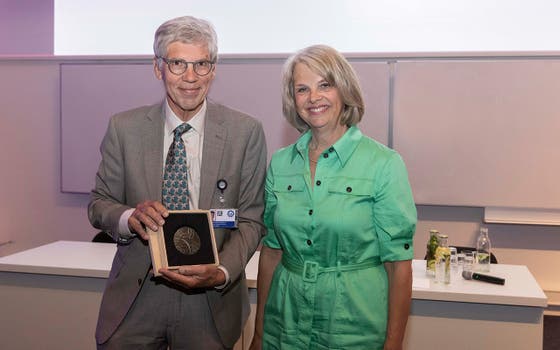WKZ medal of honour for Floris Groenendaal

Lees artikel in het Nederlands >
Floris Groenendaal, paediatrician and neonatologist at UMC Utrecht has received the WKZ medal. The reason is his excellent patient care and his important research in the field of neonatal neurology. His scientific work has great international impact, and he combines innovative research with patient care and medical education in an inspiring way. Floris Groenendaal received the medal of honour on during his farewell symposium at the Wilhelmina Children's Hospital in Utrecht from the hands of Margriet Schneider, the chairman of the Board of UMC Utrecht.
Floris Groenendaal studied medicine at Erasmus MC, where he did extensive research on the effects of oxygen deprivation at birth on the central nervous system of newborns. He started working as a neonatology fellow at Sophia Children's Hospital in 1991 and later at Wilhelmina Children's Hospital. Afterwards, he worked as a Post-Doc in the United States for a year, before returning in 1994 and being appointed associate professor within UMC Utrecht. From 1995 to 1999, he was a council member of the Neonatology Section of the Dutch Society for Paediatrics (NVK). During that period, he was also a board member of the 'Brain and Development' working group of the European Association for Paediatric Research and a board member of the education and training committee of the Neonatology Section of the NVK.
Floris Groenendaal was a member of the editorial board of the scientific journal Pediatric Research and Tijdschrift voor Kindergeneeskunde from 2005 to 2010. And published very widely himself. "As a founder in his field and with a vast knowledge of neonatal neurology, he is a top researcher who is highly regarded by colleagues internationally," says Manon Benders, professor, and department head of Neonatology. "At the WKZ, he has a clear and unified approach for children with a difficult start - and their parents." Something senior nurse Marja Poesen also appreciates in him: "His message is concrete, and he is always willing to explain, whether you asked the question once or 10 times: no problem." He takes his time and yet Floris Groenendaal also regularly sets a fast time according to the nurse: "Here I am thinking of transports of patients from the WKZ to the AZU through the tunnel, with Floris leading the way, with his big strides. That was running through for those who went along on transport and had to steer the transport incubator!"
As a co-promoter, Floris is always there for his students and as a researcher he has developed very advanced therapies, for example for children who experience severe oxygen deprivation at birth say both doctors and researchers. Neonatologist and former PhD student Mehmet N. Cizmeci on his mentor and colleague: "Dr Floris Groenendaal is calm and wise, and very approachable. He was also very supportive and encouraging. As a researcher, he was inspiring because he conducted studies that had practical implications for clinical practice. I learned a lot from him, and I enjoyed working with him on different projects."
Paediatrician Niek van der Aa adds: "Floris is a very experienced neonatologist whose keen eye will be missed. As a fellow, I had the opportunity to learn a lot from him, especially in the field of neonatal neurology. As a 'clinician scientist', he is the example of how care and science can go hand in hand and strengthen each other. What he has achieved during his career is impressive. Partly because of him, therapeutic hypothermia is now part of the standard care for children with asphyxia (a shortage of oxygen around birth) in the Netherlands, which will continue to benefit many children even after his retirement."
